Related Research Articles
Politics of India works within the framework of the country's Constitution. India is a parliamentary secular democratic republic in which the president of India is the head of state & first citizen of India and the Prime Minister of India is the head of government. It is based on the federal structure of government, although the word is not used in the Constitution itself. India follows the dual polity system, i.e. federal in nature, that consists of the central authority at the centre and states at the periphery. The Constitution defines the organizational powers and limitations of both central and state governments; it is well recognised, fluid and considered supreme, i.e. the laws of the nation must conform to it.

The Communist Party of India (Marxist) (abbreviated as CPI(M)/CPIM/CPM) is a communist political party in India. It is the largest communist party in India in terms of membership and electoral seats, and one of the national parties of India. The party was founded through a splitting from CPI in 1964 and it quickly became the dominant fraction.

The National Democratic Alliance (NDA) is a centre-right to right-wing conservative Indian political alliance led by the right-wing Bharatiya Janata Party (BJP). It was founded in 1998 and currently controls the government of India as well as the government of 17 Indian states and one Union territory.
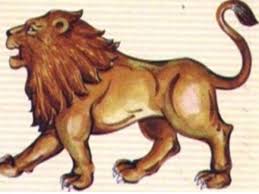
Maharashtrawadi Gomantak Party is a political party in India. It was Goa's first ruling party after the end of Portuguese rule in Goa in 1961. In the first elections held after the Annexation of Goa by India, it ascended to power in December 1963 and stayed in power till being ousted from power by defections in early 1979.

The United Progressive Alliance was a political alliance in India led by the Indian National Congress. It was formed after the 2004 general election with support from left-leaning political parties when no single party got the majority.
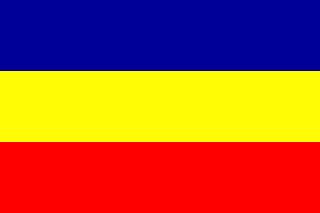
Sikkim Democratic Front (SDF) is a regional political party in the Indian state of Sikkim. It was the ruling party in Sikkim from 12 December 1994 to 23 May 2019.
Communism in India has existed as a social or political ideology as well as a political movement since at least as early as the 1920s. In its early years, communist ideology was harshly suppressed through legal prohibitions and criminal prosecutions. Eventually, communist parties became ensconced in national party politics, sprouting several political offshoots.
Elections for the Indian state of Jammu and Kashmir were held over seven days in November and December 2008. The previous government led by the Jammu and Kashmir People's Democratic Party (PDP) in coalition with the Indian National Congress (INC) collapsed when the PDP withdrew. Following the election, the Jammu & Kashmir National Conference (NC) agreed on a coalition with Congress and their leader, Omar Abdullah became the state's youngest-ever Chief Minister at 38.
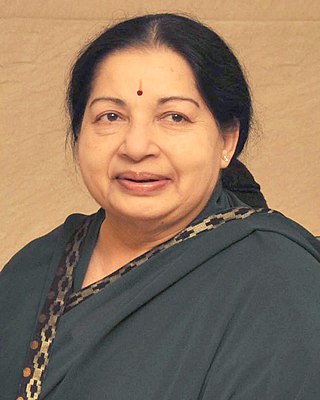
The 1998 Indian general election polls in Tamil Nadu were held for 39 seats in the state. New elections were called when Indian National Congress (INC) left the United Front government led by I. K. Gujral, after they refused to drop the regional Dravida Munnetra Kazhagam (DMK) party from the government after the DMK was linked by an investigative panel to Sri Lankan separatists blamed for the killing of Rajiv Gandhi. The result was a landslide victory for the National Democratic Alliance (NDA) winning 30 seats, which helped result in Atal Bihari Vajpayee being sworn in as the 16th Prime Minister of India. J. Jayalalithaa and the All India Anna Dravida Munnetra Kazhagam, broke off from their long alliance with Indian National Congress and formed an alliance with Bharatiya Janata Party, by joining the National Democratic Alliance. This state proved to be very important in determining the prime minister, since the 18 seats of AIADMK proved valuable for BJP to hold power. That was short-lived, since the AIADMK left the alliance in less than a year, and BJP lost the vote of confidence resulting in fresh elections being called.
Maharashtra is a state in the western region of India and is India's third-largest state by area. It has over 112 million inhabitants and its capital, Mumbai, has a population of approximately 18 million. Nagpur is Maharashtra's second, or winter, capital. Government in the state is organized on the parliamentary system. Power is devolved to large city councils, district councils, sub-district (Taluka) councils, and village parish councils. The numerically strong Maratha–Kunbi community dominates the state's politics. The state has national and regional parties serving different demographics, such as those based on religion, caste, and urban and rural residents.

Sikkim Krantikari Morcha is a political party in the Indian state of Sikkim which is the ruling party of Sikkim since 2019.

Legislative Assembly election was held in 2016 for the 294 seats of the Vidhan Sabha in the state of West Bengal in India. The All India Trinamool Congress under Mamata Banerjee won 211 seats, and thus was reelected with an enhanced majority. Like in the 2011 election, the poll was held in six phases, with the first phase divided into two days. The first phase was held in Naxalite-Maoist affected Red corridor areas with two polling dates: 4 April and 11 April. The other phases were held on 17, 21, 25, 30 April and 5 May. The result of the election was declared on 19 May.
The North-East Democratic Alliance is a political coalition that was formed on May 24, 2016, by Bharatiya Janata Party. The motive of the new political front was to protect the interest of the people of the region as well as uniting non-Congress parties in Northeast India. Himanta Biswa Sarma was appointed as the convenor of the front.
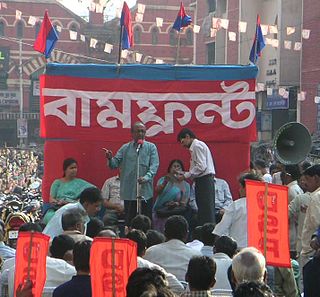
The Left Front is an alliance of left-wing political parties in the Indian state of West Bengal. It was formed in January 1977, the founding parties being the Communist Party of India (Marxist), All India Forward Bloc, the Revolutionary Socialist Party, the Marxist Forward Bloc, the Revolutionary Communist Party of India and the Biplabi Bangla Congress. Other parties joined in later years, most notably the Communist Party of India.
Elections in the Republic of India in 2018 included by-elections to the Lok Sabha, elections to the Rajya Sabha, elections to of eight states and numerous other by-elections to state legislative assemblies, councils and local bodies.
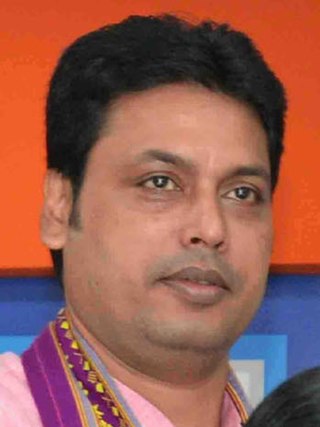
The 2018 Tripura Legislative Assembly election was held on 18 February for 59 of the state's 60 constituencies. The counting of votes took place on 3 March 2018. With 43.59% of the vote, the BJP secured a majority of seats (36) and subsequently formed the government with Biplab Kumar Deb as Chief Minister. The former governing Left Front alliance while receiving 44.35% of the vote secured only 16 seats.
Hamro Sikkim Party is a regional political party in the Indian state of Sikkim. The incumbent president of this party is Bhaichung Bhutia. Its election symbol is a Whistle.
Sikkim National People's Party (SNPP) was a regional political party (State Party (Unrecognized)) in the Indian state of Sikkim. Election symbol was Pen Nib. SNPP didn't have any relationship with Sikkim National Party (SNP) in same state or National People's Party (NPP) in the state of Meghalaya.
Delay Namgyal Barfungpa is an Indian politician.
Biraj Adhikari is an Indian politician in Sikkim.
References
- ↑ "New party formed in Sikkim". www.rediff.com. 28 August 1997. Archived from the original on 8 July 2022. Retrieved 23 July 2022.
- ↑ "Sikkim Democratic Party surges ahead in panchayat polls". rediff.com. 7 October 1997. Archived from the original on 23 July 2022. Retrieved 23 July 2022.
- ↑ "Sikkim goes back to non-partisan polls after more than a decade". Hindustan Times. 25 January 2021. Archived from the original on 29 June 2022. Retrieved 23 July 2022.
- ↑ "Ruling SDF retains LS seat, consolidates position". www.rediff.com. Rediff. 9 March 1998. Archived from the original on 31 October 2001. Retrieved 23 July 2022.